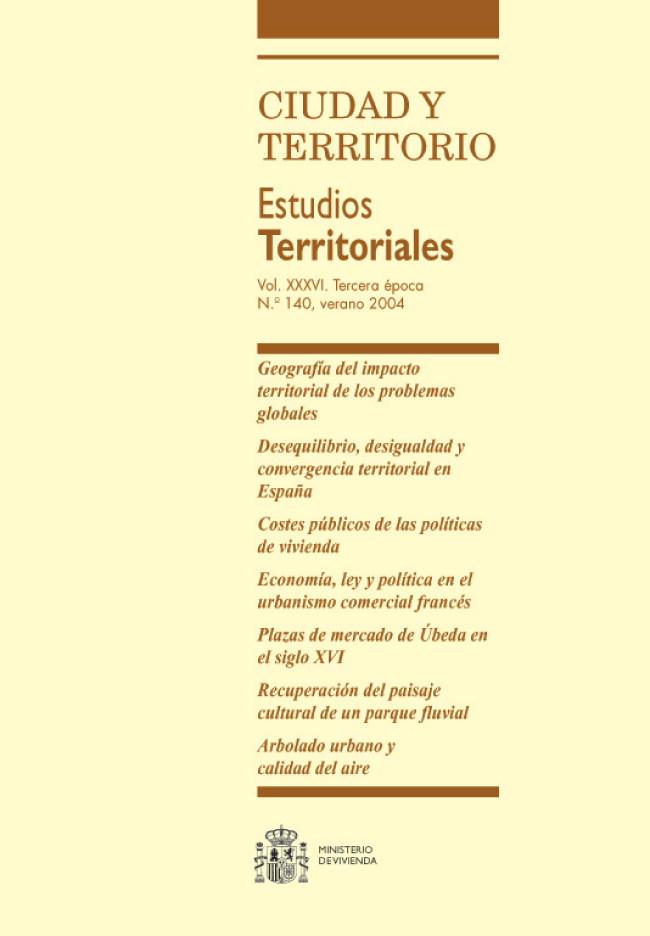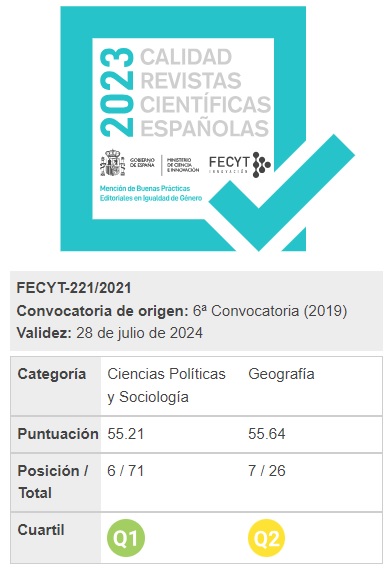Territorial Imbalances in Spain
Keywords:
Desequilibrios territoriales, crecimiento económico, política regional, convergencia económica regionalAbstract
This paper analyses the regional disparities in GDP per capita in Spain during the period from 1955 to
1998. A factoring of Theil’s index is held to reveal that the principal factor to any explanation would in this
be regional inequalities. A shift-share analysis demonstrates that the less-developed regions’ lower productivity
is not to be explained by a different productive structure but, rather, by their lower productivity in all
sectors. Given the positive relationship that exists between endowment with certain types of capital and subsequent
productivity, an analysis was undertaken of regional endowment and disparity in the same as to infrastructure,
this along with both human and technological capital being taken into account. In general
terms, this makes apparent that the least-endowed regional economies have lower productivity rates. These
results when coupled with the foreseeable increase in territorial imbalances that EU enlargement will
bring about, indicate that any cohesion policy had best continue to concentrate on the regions and be aimed
at promoting the decisive factors involved in any real convergence.
Downloads
Downloads
Published
How to Cite
Issue
Section
License
Copyright (c) 2004 María Ángeles Sánchez Domínguez

This work is licensed under a Creative Commons Attribution-NonCommercial-NoDerivatives 4.0 International License.
Considering the provisions of the current legislation on Intellectual Property, and in accordance with them, all authors publishing in CyTET give -in a non-exclusive way and without time limit- to the Ministry of Transport, Mobility and Urban Agenda the rights to disseminate, reproduce, communicate and distribute in any current or future format, on paper or electronic, the original or derived version of their work under a Creative Commons Attribution-NonCommercial-NoDerivative 4.0 license International (CC BY-NC-ND 4.0), as well as to include or assign to third parties the inclusion of its content in national and international indexes, repositories and databases, with reference and recognition in any case of its authorship.
In addition, when sending the work, the author(s) declares that it is an original work in which the sources that have been used are recognized, committing to respect the scientific evidence, to no longer modify the original data and to verify or refute its hypothesis. Author(s) also declare that the essential content of the work has not been previously published nor will it be published in any other publication while it is under evaluation by CyTET; and that it has not been simultaneously sent to another journal.
Authors must sign a Transfer of Rights Form, which will be sent to them from the CyTET Secretariat once the article is accepted for publication.
With the aim of promoting the dissemination of knowledge, CyTET joins the Open Journal Access (OA) movement and delivers all of its content to various national and international indexes, repositories and databases under this protocol; therefore, the submission of a work to be published in the journal presupposes the explicit acceptance by the author of this distribution method.
Authors are encouraged to reproduce and host their work published in CyTET in institutional repositories, web pages, etc. with the intention of contributing to the improvement of the transfer of knowledge and the citation of said works.








 Enlace a CyTET en Linkedin
Enlace a CyTET en Linkedin